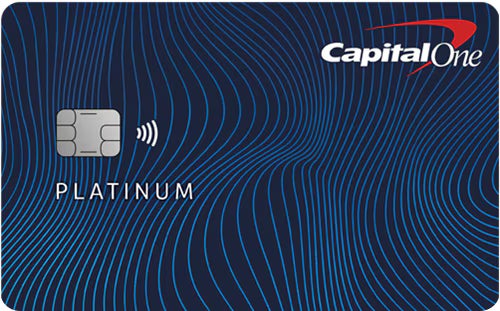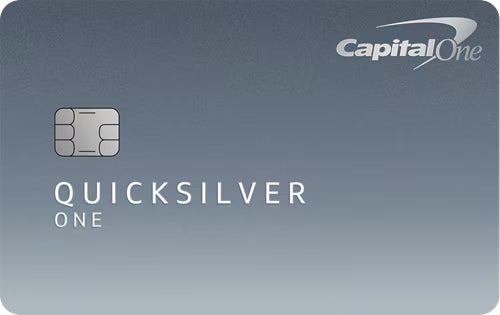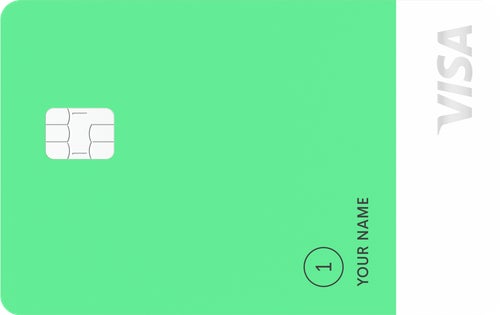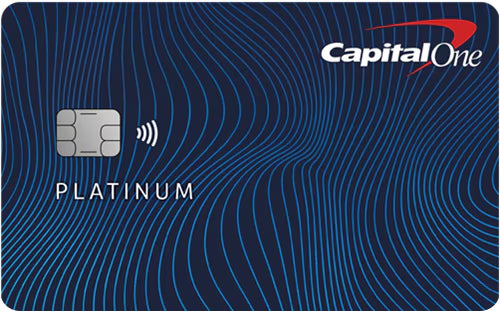| Credit Building Rating: | 4.0 / 5 |
| Cost of Membership | 3.8 |
| Ease of Building Credit | 4.0 |
| APR | 1.0 |
| Features | 2.5 |
In a Nutshell:
If you want to build credit without a secured credit card, the Capital One Platinum credit card is worth a look for its valuable perks and features that make building credit easy with responsible use.
Average cost of membership per year ($3,600 annual spend) |  |
Security deposit required |  |
Credit limit |  |
Access to higher credit line? |  |
APR |  |
Annual fee |  |
Other rates and fees
|  |
Rewards |  |
Other Notable Features: $0 fraud liability for unauthorized charges, emergency card services, Mastercard ID Theft Protection
If your credit isn’t great or you have a limited credit history, signing up for a credit-building card is a great first step to getting your score on track. Since Capital one designed the Capital One Platinum card for people with average credit, you have a good chance at qualifying, even if you’ve made a few mistakes in the past.
Unlike many unsecured credit-building cards, the Capital One Platinum card doesn’t carry an annual fee (See rates and fees). While the card also doesn’t boast a ton of extra perks, its low cost and decent credit-centric features should be a big help if your focus is getting a chance to work on your score without drowning in hidden fees. That said, keep an eye out for the high APR, which could come back to bite you if you wind up carrying a balance.
Pros
- The card is fairly light on fees for a credit-building card. There is no annual fee, foreign transaction fees or penalty APR if you miss a payment.
- Since the card is unsecured, you won’t be required to put down a large chunk of money upfront in a security deposit.
Cons
- The ongoing APR is steep, which is common for credit-building card options.
- This card does not feature a rewards program, which may limit its long-term value.
Why you might want the Capital One Platinum Credit Card
We like the Capital One Platinum card because, unlike many alternative unsecured credit-building cards, it won’t leave you buried in fees. In skipping these extra costs, you’ll have the peace of mind to focus on building your credit with responsible card use. Features like the ability to increase your credit limit over time and CreditWise credit monitoring will also come in handy on your financial journey.
Low cost of ownership
The Capital One Platinum card is lighter on fees and penalties than similar cards. To start, there’s no annual fee (See rates and fees) . Since most unsecured cards marketed to consumers with poor or fair credit require a membership fee – often charging upwards of $70 per year just to hold the card and sometimes even more in the second year – this factor is a big plus. If you stay on track with your payments, avoid carrying a balance and otherwise practice responsible card use, you have a chance to build your credit profile with the Capital One Platinum card for free.
Since the Capital One Platinum is an unsecured card, you won’t have to tie up money for months in a security deposit as you would with a secured card – often your only option if you’re trying to build credit without paying an annual fee.
The card doesn’t also incur a penalty APR in case you miss a payment (though it does charge a late payment fee, it doesn’t charge a fee for returned payments, and, most notably for frequent travelers, charges no foreign transaction fee. This last detail means you can use the card for purchases outside the U.S. without having to pay extra for the privilege.
Clear credit limit increase path and a few helpful tools
While the Capital One Platinum is relatively thin on cardholder perks, it features a couple of noteworthy benefits for credit-builders.
Most notably, the card offers a straightforward path to a higher credit limit: You’re automatically considered for a higher credit line after six on-time monthly payments. Six months is a pretty standard timeframe for a credit limit increase, but many credit-building cards offer no clear criteria for offering a higher credit limit, with many only promising to review your account periodically. In contrast, the Capital One Platinum gives you simple steps to follow to qualify for a credit limit increase, which can help you lower your credit utilization ratio – a major factor in your credit score – and give you a bit more breathing room.
Another useful credit-building perk is Capital One’s CreditWise feature – a credit monitoring portal you can access to see your credit score and monitor your credit profile. Though this tool is free and available for anyone whether they have a Capital One card or not, it’s still worth mentioning, since monitoring your credit is the best way to make sure you’re improving it over time.
Another reason to consider this card is just how simple it is to use. Capital One’s mobile app makes it easy to manage your account, bank online and pay your bill from your mobile device. You also have the option to set up account alerts that notify you when you’ve made a purchase or a payment is due, along with the option to pick your own due date and payment method. Finally, you can set up autopay for your account to ensure you’ll never forget your monthly bill. Capital One is also highly regarded for its 24/7 live customer service that is available to assist you with issues you can’t resolve online.
You can get approved with fair credit
According to Capital One, this card is geared to consumers with average credit or better. Experts define fair or average credit as a FICO score of 580 or higher. Capital One also notes that you could still qualify for this card if you’ve defaulted on a loan in the last five years or you have less than three years of credit history. While there are plenty of subprime cards on the market, most either require a security deposit or come with hefty annual, monthly or activation fees (and sometimes all three). The fact that the Capital One Platinum is both unsecured and charges no annual fee (See rates and fees) wins it major points according to our credit-building card rating system.
Why you might want another card
The Capital One Platinum is a solid option if you want to save money, focus on building your credit with responsible card use and aren’t worried about earning rewards. However, if you tend to carry a balance, it would be better to go with a card that charges a lower APR. Since this card is unsecured, you’ll also likely start out with a low credit limit, which could slow down your credit-building efforts by making it harder to maintain low credit utilization.
Low initial limit
Unfortunately, the Capital One Platinum card is likely to start you off with a pretty small credit line. While Capital One does not list a specific minimum initial credit limit in its terms, unsecured cards in this category typically offer starting limits of around $300 or – if you’re lucky – $500. Even if you get a slightly higher limit to start, this number will likely fall short of the potential limit available on many secured credit cards. That’s because secured cards typically let you set your own limit within a broad range of potential credit lines by putting up a matching deposit. High-limit secured credit cards like the Discover it® Secured Credit Card, for example, allow you to secure as much as $2,500 in credit when you put down a matching deposit. A larger credit line can help you build your credit faster, since it makes it easier to keep your credit utilization ratio in check.
High APR
The Capital One Platinum card is not a card you’ll want to carry a balance on due to its high 28.99% (Variable) APR (See rates and fees), far higher than the average credit card interest rate and relatively high even for a credit-building card. While high APRs are unavoidable to a degree when you have a less-than-ideal credit score, several alternative credit-building cards beat out the Capital One Platinum on this front, including secured cards like the opensky® Secured Visa® Credit Card – which offers all cardholders a 23.89% (variable) APR, regardless of credit history – and unsecured cards like the Petal® 2 “Cash Back, No Fees” Visa® Credit Card – which, though its high-end APR of 32.24% variable exceeds the Capital One Platinum card’s 28.99% (Variable) APR (See rates and fees), at least offers a chance at a rate as low as 18.24% variable based on your financial profile.
If you do sign up for this card to build credit and take advantage of cardholder perks, you should create a plan to pay your balance in full each month and, if needed, only charge small purchases you can pay off right away.
No rewards and limited perks
Another major downside to consider with this card is that it doesn’t offer a rewards program. Since a handful of credit cards geared to consumers with average credit offer the opportunity to earn cash back – with some offering at least 1% back on every purchase you make – this lack of rewards potential is disappointing. While you won’t have to pay to hold the Capital One Platinum card, you also won’t get rewarded for using it beyond its credit-building potential. The card’s limited benefits don’t help much either, with shrug-worthy highlights including the ability to get a replacement card and a cash advance (depending on your available credit) if your card is lost or stolen, $0 fraud liability for unauthorized charges, and assistance if you become a victim of identity theft.
How does the Capital One Platinum card compare to other credit-building cards?
The Capital One Platinum’s low cost of ownership is easily its most appealing feature and could be enough to make it the best card for someone with average credit hoping to take their score to the next level – especially if you’re hoping to avoid putting down money in a security deposit. That said, a few other cards available for people with fair credit are worth a look thanks to their similar low cost and more robust perks. Here are a few of our favorites:
 |  |  |
Rewards rate
| Rewards rate
| Rewards rate
|
Credit limit
| Credit limit
| Credit limit
|
| Annual fee $0 (See Rates and Fees) | Annual fee $39 (See Rates and Fees) | Annual fee $0 |
Other things to know
| Other things to know
| Other things to know
|
Capital One Platinum card vs. Capital One Platinum Secured Credit Card
Another Capital One option for building credit (with responsible use, of course) is the Capital One Platinum Secured Credit Card, a no annual fee card (See Rates and Fees) geared toward consumers with a damaged or limited credit history.
Unlike the Capital One Platinum, the Capital One Platinum Secured is a secured credit card, which means you’ll need to put down a refundable security deposit before you can use the card. While this added cost may not work if you’re short on cash or want to avoid tying up money, it could offer a big advantage if you want more control over your credit limit and, consequently, your credit utilization. Not to mention there’s a possibility you could graduate to an unsecured card, as some users have reported.
Secured cards typically assign you a credit limit that matches your deposit, so if you put down a large amount, you can enjoy a bit more room to spend without worrying about hurting your score with high credit utilization. Additionally, the Platinum Secured card guarantees a minimum initial credit limit of $200 with a refundable security deposit starting at $49, a unique feature among secured cards. While both cards can help you build your credit with responsible use, which is best for you will depend on your financial situation and habits.
Capital One Platinum card vs. Capital One QuicksilverOne Cash Rewards Credit Card
Another unsecured option from Capital One, the QuicksilverOne Cash Rewards Credit Card offers simple rewards and some limited but noteworthy benefits while also only requiring fair credit to qualify – notably a flat 1.5% cash back rate on all eligible purchases. The tradeoff for a better rewards program is an annual fee of $39 (See Rates and Fees) – which, while not the highest among unsecured cards, could be a deal-breaker if you’re a modest spender and doubt you’d spend enough in a year ($2,600) to cover the cost. If you tend to carry a balance, the card’s high 28.99% (Variable) APR won’t give you any advantage over the Capital One Platinum card’s rate, either. Like the Platinum card, however, the QuicksilverOne gives you a chance to earn a credit line increase after six months of on-time monthly payments.
Capital One Platinum card vs. Petal 1 “No Annual Fee” Visa Credit Card
The Petal 1 card is a terrific option for credit-builders since it’s available even with fair credit, charges no annual fee, does not require a security deposit and offers a chance at a credit limit as high as $5,000, depending on your credit history and financial profile. The card is also notable for its flexible approvals process: The issuer can consider more than just your credit score when you apply and may take into account other financial data like your bill payment history. This extra info will be a big help if you’ve had some credit missteps in the past, but are otherwise on solid financial ground.
How to use the Capital One Platinum card:
- Use the card for regular purchases you can afford to pay off each month. Never carry a balance since you’ll be charged a high APR if you do.
- Given you’ll likely start off with a low credit limit, try to keep your spending in check to ensure your credit utilization doesn’t spike, which will negatively impact your credit. Strive to use your card only for small purchases you can pay off right away.
- Make all of your payments on time to avoid late payment fees and have a better chance at getting a credit limit increase after your first six on-time monthly payments.
- Take advantage of CreditWise to monitor your credit and ensure you’re staying on track with your credit-building efforts.
Is the Capital One Platinum card right for you?
If you want a simple, low-cost credit-credit building card that doesn’t require you to put down any money for an annual fee (See rates and fees) or security deposit, it’s hard to go wrong with the Capital One Platinum. While it won’t offer impressive rewards or perks and carries a high APR, the card gets the job done where it counts – giving you a chance to build credit with responsible use without bombarding you with fees and restrictions.
For Capital One products listed on this page, some of the benefits may be provided by Visa® or Mastercard® and may vary by product. See the respective Guide to Benefits for details, as terms and exclusions apply.
All reviews are prepared by CreditCards.com staff. Opinions expressed therein are solely those of the reviewer and have not been reviewed or approved by any advertiser. The information, including card rates and fees, presented in the review is accurate as of the date of the review. Check the data at the top of this page and the bank’s website for the most current information.
Responses to comments in the discussion section below are not provided, reviewed, approved, endorsed or commissioned by our financial partners. It is not our partner’s responsibility to ensure all posts or questions are answered.
Partner Offer: carefully review product terms on Capital One's site before applying
